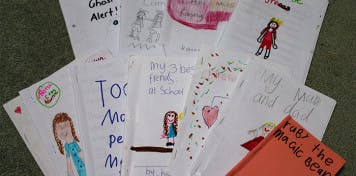


10 Ways to Help Improve Your Child's Writing Skills

Helping your child develop essential writing skills should be fun! Explore hundreds of online writing activities for kids with Reading Eggs. Free trial
Children's imaginations seem to always be filled with interesting concepts, ideas and stories. But capturing those things and putting them on paper isn't always quite as easy.
Writing helps children become better readers, and reading helps children become better writers.
Luckily, there are a few things you can do at home to help encourage your child's writing skills.
1. Keep writing supplies on hand
Inspiration can strike at any moment.
Encourage your child to keep a pencil and notepad handy on family outings. At home, provide ready access to a writing desk equipped with pencils, paper, erasers, books and a wastepaper basket.
2. Encourage journal writing
Buy a journal for your child and encourage them to make a short daily entry about their day. Talk to them about what they enjoyed doing and ask questions to encourage their thinking.
Try not to get too caught up in spelling, respect their privacy if requested, and let them feel like it's a safe place for them to write in without any judgement.
3. Use a chalkboard or family message board
Children need to understand that the act of writing is purposeful.
Let your child contribute items to the family shopping list or write messages on the family message board. Don't forget to acknowledge their contribution.
Help your child gain essential writing skills with Reading Eggs!
Reading Eggs includes hundreds of self‑paced reading lessons, fun games and over 4,000 books to choose from! Kids can also enjoy the Story Factory, which gives children a step‑by‑step guide to writing a story – perfect for encouraging your child's writing skills at home!
4. Write letters
If you send regular greeting cards, letters or emails to friends and family members, invite your child to write and send their own messages to relatives.
Allow time for practice by creating several draft versions together and taking turns reading them out loud.
5. Provide writing prompts
Creative writing can be tricky, and it's often helpful to give your child a topic or theme to write about. You can create simple prompts and have your child fill in the rest.
For example, ‘If I could choose to be an animal, I would choose to be a…’, or ‘The bravest thing I have ever done was…’
Reading Eggs has an interactive story‑writing guide which provides useful word, sentence and illustration prompts. You'll find this guide in the Story Factory section. Try it for free here.
6. Create a storyboard
A storyboard is a series of pictures that tell a story and resembles a comic strip.
Creating a storyboard is a fun and helpful way for your child to plan their story and draw pictures to help them clearly envisage what will happen.
A storyboard can be particularly helpful for kids to recollect and express their dreams through creative writing.
7. Read before writing
Reading a book before setting pen to paper helps your child become familiar with story structure.
Choose a book with a traditional 'beginning', 'middle' and 'end' and explain how the story is structured before they create their own.
8. Create your own storybook
Homemade story books offer a wealth of benefits for your child.
Provide a variety of paper and pencils and use other books as models for creating your own.
9. Encourage enthusiasm for writing through imaginative play
This is a good idea to encourage younger children to take an interest in writing.
You can pretend to be working in a post office and have your child 'write' and reply to handwritten letters with scribbles.
Alternatively, pretend to be a customer at a restaurant and have your child take down your order.
Discover more benefits of pretend play.
10. Be their biggest cheerleader
Always offer positive feedback and take an interest in your child's writing.
Praise them for attempting to write words that are new and show them how to spell difficult words that they may not have been able to spell correctly.
Help your child gain essential writing skills with Reading Eggs!
Reading Eggs includes hundreds of self‑paced reading lessons, fun games and over 4,000 books to choose from! Kids can also enjoy the Story Factory, which gives children a step‑by‑step guide to writing a story – perfect for encouraging your child's writing skills at home!
For more creative writing tips and ideas, check out our other articles:






